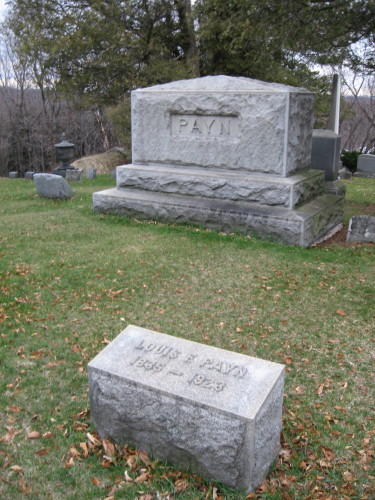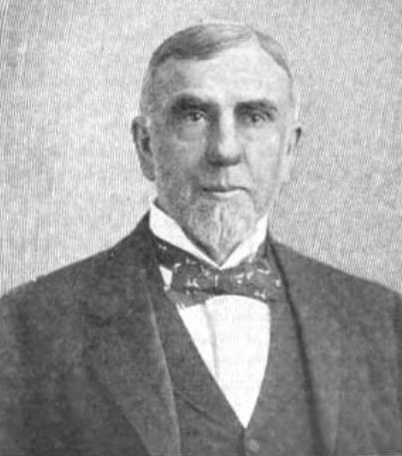Political boss of New York State during the Gilded Age; Prominent paper manufacturer in Columbia County; Founded the Chatham Republican newspaper; Elected delegate to every national Republican convention from 1864 (Lincoln)to 1920 (Harding); Enthusiastic supporter of President Lincoln; Appointed Harbor Master for the Port of New York in 1866. In the early 1870s, he broke with friend and political ally Reuben Fenton when Fenton sided with the Liberal Republicans. As a Stalwart Republican, a conservative follower of New York's political boss Roscoe Conkling, Payn emerged as vital member of Conkling's machine. Impressed by Payn's practicality, Senator Conkling secured President Grant's appointment of him to United States Marshal for the Southern District of NY. When Grant sought a third term, Payn was a vocal member of the "Band of 306" delegates that steadfastly supported Ulysses Grant's 1880 bid for a third term for president at the Republican convention. He also engineered the nomination of Thomas C Platt to serve a the junior US Senator alongside Conkling in 1880. In 1881, along with other key Conkling henchmen, Payn visited President-Elect Garfield to pressure him to appoint Levi P Morton as Secretary of Treasury, which Garfield refused to do. When Senators Conkling and Platt resigned in protest of Garfield's political appointments, Payn loyally supported them when they opted for re-election. With the demise of the Conkling machine, he remained a close ally of Thomas C Platt, who in the 1890's became a US Senator again and political boss of NY. Along with Platt, Payn was instrumental in having Congressman Frank Black of Troy succeed Levi P Morton as Governor of NY. In 1897, Platt saw to it that Payn was appointed NY State Insurance Commissioner, but in 1900 the new progressive Governor Theodore Roosevelt removed him from this post due to suspected corruption. Payn remained active in local politics in his later years and continued to serve an elector at the Republican Conventions through 1920. He died of pneumonia at age 88 in his grand Victorian home in the village of Chatham, NY. In his will, Payn solidified his reputation as a philanthropist by ordering the demolition of this house for the purpose of building a facility for the aged residents of Columbia County. This brick building was constructed in 1929, still exits today as a non-for-profit retirement residence for independent senior citizens.
Political boss of New York State during the Gilded Age; Prominent paper manufacturer in Columbia County; Founded the Chatham Republican newspaper; Elected delegate to every national Republican convention from 1864 (Lincoln)to 1920 (Harding); Enthusiastic supporter of President Lincoln; Appointed Harbor Master for the Port of New York in 1866. In the early 1870s, he broke with friend and political ally Reuben Fenton when Fenton sided with the Liberal Republicans. As a Stalwart Republican, a conservative follower of New York's political boss Roscoe Conkling, Payn emerged as vital member of Conkling's machine. Impressed by Payn's practicality, Senator Conkling secured President Grant's appointment of him to United States Marshal for the Southern District of NY. When Grant sought a third term, Payn was a vocal member of the "Band of 306" delegates that steadfastly supported Ulysses Grant's 1880 bid for a third term for president at the Republican convention. He also engineered the nomination of Thomas C Platt to serve a the junior US Senator alongside Conkling in 1880. In 1881, along with other key Conkling henchmen, Payn visited President-Elect Garfield to pressure him to appoint Levi P Morton as Secretary of Treasury, which Garfield refused to do. When Senators Conkling and Platt resigned in protest of Garfield's political appointments, Payn loyally supported them when they opted for re-election. With the demise of the Conkling machine, he remained a close ally of Thomas C Platt, who in the 1890's became a US Senator again and political boss of NY. Along with Platt, Payn was instrumental in having Congressman Frank Black of Troy succeed Levi P Morton as Governor of NY. In 1897, Platt saw to it that Payn was appointed NY State Insurance Commissioner, but in 1900 the new progressive Governor Theodore Roosevelt removed him from this post due to suspected corruption. Payn remained active in local politics in his later years and continued to serve an elector at the Republican Conventions through 1920. He died of pneumonia at age 88 in his grand Victorian home in the village of Chatham, NY. In his will, Payn solidified his reputation as a philanthropist by ordering the demolition of this house for the purpose of building a facility for the aged residents of Columbia County. This brick building was constructed in 1929, still exits today as a non-for-profit retirement residence for independent senior citizens.
Family Members
Sponsored by Ancestry
Advertisement
Explore more
Sponsored by Ancestry
Advertisement






